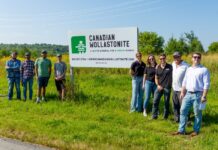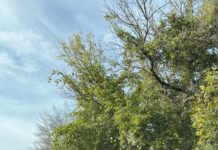by Colin Creasy
While I was pleased to see that my last letter regarding farming practices has generated debate, I am a little disappointed that the points that I was making didn’t seem to resonate with the two people who responded.
To begin, my previous letter was in no way meant as a criticism of our farmers, nor how they go about their business. I totally understand that farmers are just responding to market demands, just as I understand that there are economies of scale regarding certain crops.
The problem is the system under which we live, and our individual habits. Farmers are simply responding to the market as it is currently set up, and they are doing an amazing job considering how few of them there are.
Climate change discussions have hardly mentioned what it means to people who feed the nation: Canada’s farmers. Farming has always been a challenge, but there was always some predictability to that challenge. Due in large part to climate change, that is no longer the case. Droughts and violent storms result in lower crop yields, reduced milk production, and loss of livestock. Farmers are truly on the front line of all this. There is a thin line between success and failure on the farm, and climate change is a wildcard that is a threat to all of us.
The primary point of my previous letter was that when 68% of our farmland is taken over for growing crops for farm animals, the simple act of changing our diets even for a couple of days a week could prevent the need to burn down our rainforests, or clear cut others, just to provide food for farm animals. Forests are the lungs of our planet, storing carbon dioxide, and giving off life-sustaining oxygen. Another of your correspondents, (Global warming is not the cow’s fault), was positing that the plant life on this planet could keep on doing this indefinitely, even though we are destroying this same plant life at an alarming rate, and, on top of that, he figured that pasture land could provide the same benefit as the rainforest that was destroyed to provide it. I’m having a hard time believing that grass provides the same benefits as a forest.
Regarding my previous musing on organic food, I have, in my previous lifetime, been affiliated with a community organic farm. We leased the land from the local conservation authority, and it took four years of growing crops with no pesticide or herbicide use on the land before we could become a certified organic farm. There was a lot of paperwork and soil testing involved, and then there was the labour cost of removing weeds. The cost of these 2 items did not offset the savings from pesticide and herbicide use, which is why we pay more for organic. A lot of people who try and eat organically are often sceptical of claims by the Monsanto’s of this world that their products are safe, which is why we are willing to pay a little more. You can’t blame us. There is a lot of information out there to support our scepticism.
One last thing about “global warming is not the cows fault.” Not totally, but it is contributory, more so if you figure in conversions of forest to pasture or crop land to feed farm animals. Also, the methane gas that they exhale, essentially the same methane generated by the oil and gas industry, traps 84 times more heat than carbon dioxide. That methane is only around for about a decade is not relevant, because long before then, the damage has already been done to our oceans. The oceans absorb some of the trapped heat generated, and water, as it warms, expands. Warm surface water is being constantly exchanged with colder water from lower levels in a cyclical action, and currents carry this around the world. Scientists believe that this warmer water could remain in the oceans long after our lifetimes, so it is a serious concern.
I have never been a fan of cherry-picked facts, and it is encouraging to see people checking deeper into what they are being told. I write, in large part, to get a conversation going, because we need to come together, because, if we don’t, then future generations are going to pay for our inaction. A 2011 study by the federal government concluded that total economic costs to Canada of climate change would range from $21 billion to $43 billion by 2050. This is the bill that we are handing to our children and grandchildren because we keep electing governments that do little, or in the case of the Ford administration, move us backwards.
The status quo is no longer an option. If we had started doing something 30 years ago, when we were warned, then we probably wouldn’t be in the situation that we now find ourselves in. We know what is going on around us, but many refuse to see what is right under their noses, because they either don’t want to change, or, as one person I came across recently said, “it’s my kids problem, not mine”.
I can’t be like that.









Hi, Colin. Bravo for keeping the conversation going. I wanted to point out that at the last Leeds-Grenville Committee of the Whole meeting last week they passed a motion on a report made by our CAO Andy Brown to have him and a committee of CAOs of the various local counties pursue a climate adaptation and mitigation plan. Mayor Peckford made the motion. This action comes after the new Sustainable Merrickville-Wolford group circulated a petition last fall asking the County to declare a climate emergency and initiate a climate action taskforce to create a plan. I made a delegation to the Committee in November and presented the petition on behalf of our group. I hope there will be consultations broadly in the coming months, including with local farmers, business people, citizens, to talk about both the challenges we will face (and if you think about the floods, and the spread of Lyme disease, those we are already facing), and the opportunities that are presented as we all transition to a low-carbon future. We all need to be having these conversations in our homes, workplaces and communities in order to get where need to go.